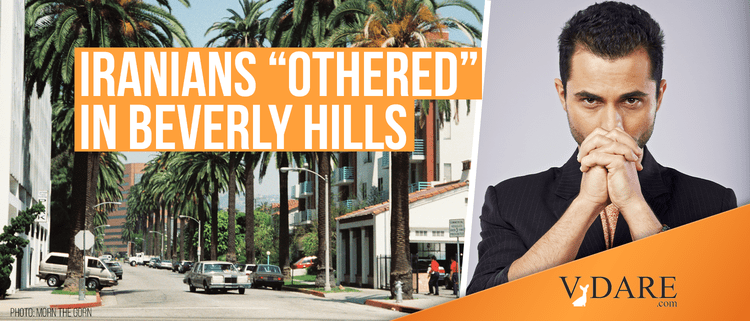


By Steve Sailer
02/04/2020
From the Associated Press:
‘Othered’ in America: An old story, still playing out daily
By NOREEN NASIR and RUSSELL CONTRERAS
yesterday… For many young Iranian Americans, this is a mobilizing moment: They are embracing their Iranian identity and beginning to identify as people of color in the U.S. as part of a larger struggle alongside other ethnic minorities.
For minorities in the United States — from Latinos to African Americans to Muslims and beyond — being viewed with suspicion is something that can happen at any time in a number of ways. A citizenship status questioned. A hate crime committed. Even simply a passing comment made that implies they aren’t welcome in the U.S., or deserving of the same treatment as white Americans.
Activists say the episodes make minorities feel separated — “othered,” as the recently coined verb puts it.
… Much of the inspiration for Katebi’s work stems from her identity. Her Twitter bio reads, in part: “angry daughter of immigrants.” She was born and raised in Oklahoma and, as a practicing Muslim who also wears the hijab, or headscarf, found herself having to constantly explain her identity to others.
“No one knew what I was,” Katebi said, describing growing up in a post-9/11 America as “politicizing.”
… The Iranian American community is quite diverse — politically, socioeconomically and religiously. It includes Muslims, Jews, Zoroastrians and others with cultural ties to Iran and a range of views and opinions about leadership and politics in Tehran and Washington.
Iranian immigrants arriving in the U.S. after the 1979 Iranian Revolution were immediately confronted with hostility and discrimination. As a result, many sought to distance themselves from their national identity and the politics of their homeland by referring to themselves as “Persian.”
The blending of identity was further muddled by government forms, including the U.S. census.
In other words, white people oppressed Iranians by declaring them white.
Many Iranian Americans have historically marked themselves as “white” when reporting their race for the census.
But the Flight from White is cranking up as Iranians figure out that there’s no upside in being officially white in America.
But many younger Iranian Americans are pushing back against that categorization in part because they realize that no matter how American they are, they are still seen as “forever foreigners” by American society, said Neda Maghbouleh, a University of Toronto assistant professor and an author who studies the politics of race within the Iranian American community.
This would do wonders for the diversity scores of Beverly Hills, which was estimated to be 20% Iranian in 2007.
“Iranian Americans have navigated a significant sense of exclusion at every stage of their story as a community since arriving as a critical mass post-1979,” Maghbouleh said.
They had to hunker down for their own protection on Rodeo Drive.
Hoosh Afsar came to the U.S. from Iran 43 years ago, just before the revolution. Now 58, the Bethesda, Maryland, resident said the rhetoric surrounding the 2016 presidential election made him much more aware of racial injustices in the U.S.
“Before Trump’s election, I probably saw myself as more included and accepted. Now I feel that I was delusional,” he said.
Afsar credits his daughters with helping him understand the issue of race and inequality in the U.S. and identifying more as a person of color. He founded the Racism Awareness Project in 2017 to educate other Iranians and immigrants on the history of race in America. …
Indeed, recent incidents of “othering” people of different minority groups — ranging from violent attacks to more subtle forms of prejudicial treatment — have highlighted this common plight.
… Last month, a Native American woman traveling through the Minneapolis-St. Paul International Airport said a Transportation Security Administration agent pulled the woman’s long braids and said “giddyup” while snapping them like reins of a horse. The following week, tellers at a Detroit-area bank refused to cash $99,000 in checks from a black Air Force veteran, suspecting him of fraud, and calling the police.
Some civil rights groups also note how the current climate is uniting people of different minority groups. … Alborz Ghandehari, 31, whose parents are from Iran, said he saw support almost immediately. While recently protesting possible war with Iran, he was joined by black, white and Latino demonstrators. During the demonstration, a motorist drove by and yelled “terrorists!” at him and others.
“On the one hand, it was inspiring to see the support from others,” said Ghandehari, an ethnic studies assistant professor-lecturer at the University of Utah.
Of course the U. of Utah has an Iranian ethnic studies professor. Of course it does.